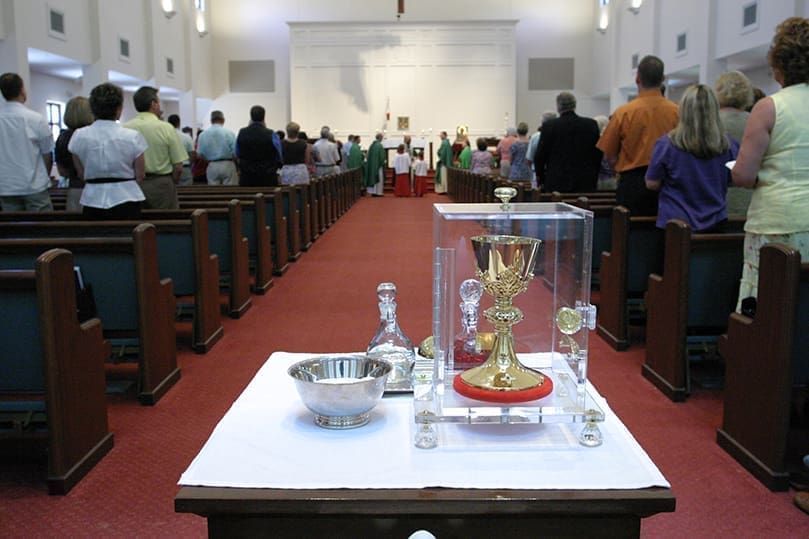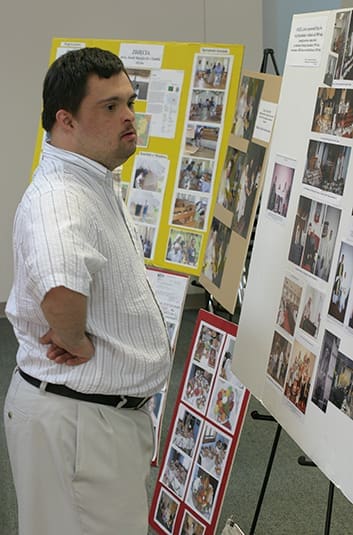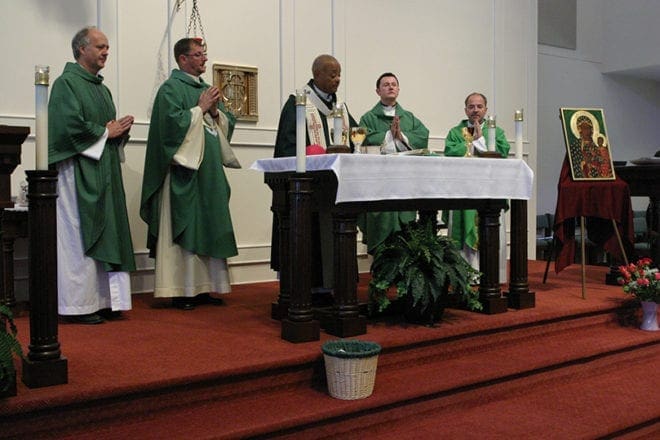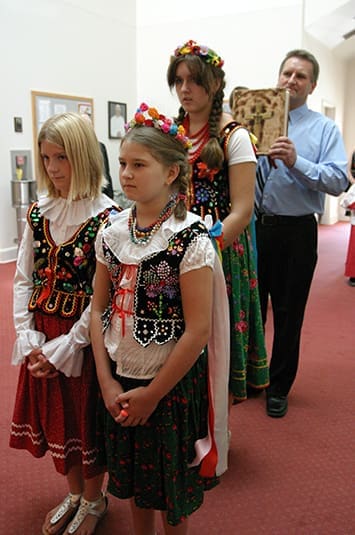 Photo By Michael Alexander
Photo By Michael AlexanderLawrenceville
Apostolate Marks 10 Years Of Weekly Mass In Polish
By STEPHEN O'KANE, Staff Writer | Published October 14, 2010
As the Archdiocese of Atlanta grows more and more culturally diverse, Archbishop Wilton D. Gregory is taking time to celebrate with each international community. He recently celebrated Mass with the well-established Polish community to recognize 10 years of continuous ministry.
The archdiocese has included Polish Catholics for many years—longer than a decade—but Polish Masses were not always available. Just ask Elizabeth Gurtler-Krawczynska who moved to the Atlanta area with her husband in 1984.
“When I came with my husband, we only knew a few families,” she said, noting how much Atlanta as a city has grown since then. “There were only about one million people in Atlanta at that time. Now there are over five million.”

Michael Komor looks over the photos chronicling various events within the Polish Catholic Apostolate. Komor’s father Jonusz is the organist for the Polish Catholic community. Photo By Michael Alexander
The Polish Apostolate in the archdiocese now has nearly 150 families who live throughout the northern and eastern metro area from Winder to Woodstock. And the small Polish Catholic community that began to come together many years ago is now celebrating a decade of having an uninterrupted weekly Mass in Polish.
Their roots go back to the 1980s when the few Polish-speaking Catholics in Atlanta felt the compelling need to have a Polish priest to minister to their growing community. In November 1989 Father Kazimierz Jasiński from the Society of Christ for Polish Emigrants began to celebrate Sunday Masses in Polish, first at St. Thomas More Church, Decatur, and then at the Shrine of the Immaculate Conception, Atlanta.
After two years, the numbers supporting the Polish Apostolate had decreased, and in 1992, Father Jasiński celebrated the last Mass in Polish as he had been transferred to another parish. Since the religious order did not send a replacement, the group had to begin the search for another priest in order to continue with Masses in Polish.
Gurtler-Krawczynska found Father John Ozarowski, a Polish-American priest serving in the Archdiocese of Atlanta. The Atlanta archbishop gave his permission for the priest to serve the Polish community and that year 200 families had Polish Masses on Christmas and Easter.
When Father Ozarowski passed away in February 1994, the search for another Polish-speaking priest led to Father Adam Ozimek, who was originally from Poland. Father Ozimek, who belonged to the Archdiocese of Atlanta and was an associate pastor at Holy Spirit Church, Atlanta, began celebrating Masses in Polish once a month.
Throughout the next few years, the Polish community followed Father Ozimek as he was moved to St. Lawrence Church in Lawrenceville. However, in 1997, Father Ozimek was named pastor at Our Lady of the Mount in Lookout Mountain. The “Polonia” in Atlanta were again left without a Polish-speaking priest.
Over the next few years, the Polish Apostolate reached 600 members but were without a priest, and Father Stefan Filipowicz, a Jesuit priest from Chicago, came to celebrate a Polish Mass on Christmas and Easter. With such a large group, the need for a resident priest continued to grow. After many prayers, the community brought Father Stanislaw Drzal, another Society of Christ for Polish Emigrants priest, to Atlanta. Ever since his arrival in August 2000, Polish Masses have been celebrated every Sunday.
In 2002, the Masses were moved to St. Marguerite d’Youville Church, and the residence for Father Drzal was moved to the Lawrenceville location as well.
Father Janusz Zych, SChr, replaced Father Drzal in December 2004, as the latter retired due to illness. Father Zych led the Polish Apostolate until February 2009, when the Society of Christ sent Father Marek Ciesla, SChr.
A new priest, Father Piotr Nowacki, SChr, recently took over as head of the Polish Apostolate in Atlanta and has now served for just over two months. He led an all-Polish community in Toronto for three years before arriving in Georgia and has been adjusting as he leads this English/Polish community in Atlanta.
Archbishop Gregory celebrated Mass in his first official visit with the Polish community Sept. 5, honoring their presence within the archdiocese and recognizing the 10 years of uninterrupted Polish Masses, which came as a result of much hard work.
“On the occasion of this my first official visit with Polonia here in Atlanta, I want to assure you of my personal affection and deep respect,” the archbishop said. “As a native son of the Archdiocese of Chicago, I know firsthand of the many gracious gifts of faith and culture that the people of Poland have offered to the church here in the United States of America.”
“Throughout all the time of our national history, local churches have benefitted from the presence of the sons and daughters of Poland who have enriched the life of the Church and added to the vast blessings of our nation,” he continued.

Archbishop Wilton D. Gregory, center, was the main celebrant for the afternoon Mass. Joining him on the altar is (l-r) Society of Christ Fathers to Polish Migrants Father Marek Ciesla of Denver, Col., Father Piotr Nowacki, chaplain of the Polish Catholic Apostolate, Father Adam Ozimek, parochial vicar St. Jude the Apostle Church, Atlanta, and Society of Christ Fathers to Polish Migrants provincial Father Pawel Bandurski, of Lombard, Ill. Photo By Michael Alexander
Father Nowacki recently wrote a letter expressing his gratitude to the archbishop for his recognition of their ministry.
“Your visit was the highlight of the 10th anniversary of the uninterrupted weekly Masses in Polish for Polish-speaking Catholics in the Atlanta Archdiocese, for which we are very grateful,” Father Nowacki said. “I am confident that this celebration will remain in our memory and our hearts for years to come, and it will strengthen our faith and our community spirit.”
Gurtler-Krawczynska said the Polish Apostolate has been a crucial presence for the Polish people of Atlanta as well.
“It gives Polish people a pride of their culture,” she said, adding that the Polish-speaking community of Atlanta now has a place they can feel comfortable celebrating their heritage.
As the community continues to find its foothold in American society, they have struggled a bit preserving traditions that link them to the lives they left behind.
These traditions, including celebration of Mass in Polish, are important to the people, said Gurtler-Krawczynska. “You cannot just wipe out these traditions,” she said.
One of the adjustments many Polish people experience in the U.S. is the accessibility of the priest. Gurtler-Krawczynska said in Poland the priest holds a special place within the community and is often somewhat distant from the people. Having a priest stay in the narthex after the Mass to greet the people is something they were not used to. Here the priest is a part of the community and seen as a typical person, Gurtler-Krawczynska said.
And everyone has become a “volunteer” in the community as the people feel responsible for sustaining the Apostolate. Members of the Polish Apostolate completely support the activities of the group as well as the living expenses of the priest who ministers to them. This creates a special bond between the members, not only because of their cultural heritage but also because they have invested their own time and money in the upkeep of the ministry.

(Back to front) Joseph Madrzyk, holding the Lectionary, prepares to process into the sanctuary with his daughters Magdalena, 14, and Olivia, 10, and their cousin Patricia, 10, front left. Photo By Michael Alexander
To do this the Apostolate raises money throughout the year. The most popular event, for Polish-speakers and non-Polish-speakers alike, is the Pierogi Festival, which draws hundreds each year to have a taste of a variety of homemade pierogi, or filled dumplings. Last year the group produced nearly 5,000 pierogi for the festival, which sold out quickly. This year, they provided more than 10,000 pierogi to serve all the hungry guests. The day also includes entertainment, with music and dancing, among other activities.
Each Sunday at 2 p.m. at St. Marguerite d’Youville, the group continues to grow and fill the pews. Gurtler-Krawczynska and her fellow Polish Catholics look forward to the future of the Apostolate and the challenges they may face in the future.
“This is something we need to continue as long as there is a demand,” she said.
“I applaud all of you for keeping your faith alive and rejoicing in your rich Polish heritage that continues to be a great gift not only to you but to all of us who love you as our dearest sisters and brothers in Christ,” Archbishop Gregory told the community. “May Our Lady of Czestochowa preserve all of your great gifts and strengthen your faith in and love for her son.”
For more information visit www.pcaaa.org.